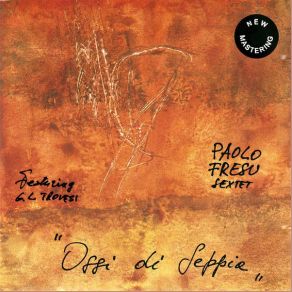Ossi di seppia
Download links and information about Ossi di seppia by Paolo Fresu Sextet. This album was released in 1991 and it belongs to Jazz genres. It contains 10 tracks with total duration of 55:48 minutes.

|
|
|---|---|
| Artist: | Paolo Fresu Sextet |
| Release date: | 1991 |
| Genre: | Jazz |
| Tracks: | 10 |
| Duration: | 55:48 |
| Buy it NOW at: | |
| Buy on iTunes $9.90 | |
| Buy on Amazon $8.99 | |
Tracks
[Edit]| No. | Title | Length |
|---|---|---|
| 1. | Dungeons and Dragons | 7:04 |
| 2. | Ossi di seppia | 8:04 |
| 3. | Appuntamento sul treno | 4:33 |
| 4. | Opale | 5:42 |
| 5. | Rolling Car | 3:29 |
| 6. | Born In the Zoo | 5:36 |
| 7. | Notti di dicembre | 9:06 |
| 8. | The Open Trio | 7:09 |
| 9. | Rolling Car | 1:38 |
| 10. | To M. | 3:27 |
Details
[Edit]This 1991 date shows the Paolo Fresu Sextet in excellent form. Having played together nearly ten years and issuing a handful of albums during that time, this is a band who understands how important the jazz tradition is and also how important it is to extend that tradition's finer points. Along with Mario Schiano, Fresu might be Italy's most famous bandleader, and it shows here in his security. This set of ten numbers is band-written; four of the sextet's members contribute to the album. Fresu writes the most, but that's because he's as much a composer as a trumpeter, but there are also fine pieces here by Roberto Cipelli, Attilio Zanchi, and Trino Tracanna. There's a lot of nodding to the cannon here. First there's the dedication to Monk by Fresu, "Dungeons and Dragons," which quotes in an off-tempo way directly from the maestro's "Brilliant Corners," a tune that Tracanna grafts onto too on his "Born in the Zoo," but for its intervallic structure in the melodic sequence. There's a number of other riffs taken and built upon as well, like the wispy West Coast jazz of the '50s that is used to stunning effect in Fresu's "Apputtamneto Sul Treno." Ultimately, though, this is the sound of the sextet, with saxophonist Gianluigi Trovesi and drummer Ettore Fioravanti rounding out the band, exploring their brand of deeply lyrical improvisation and composition. On this side of the Atlantic listeners went wild over the Marsalis Brothers' neo-traditionalist rip-off music, while these guys were taking the lineage of the jazz tradition and doing something with it. If you want the future that comes from the tradition, try looking to Italy, not New York, for your inspiration; playing great tunes isn't enough for them.